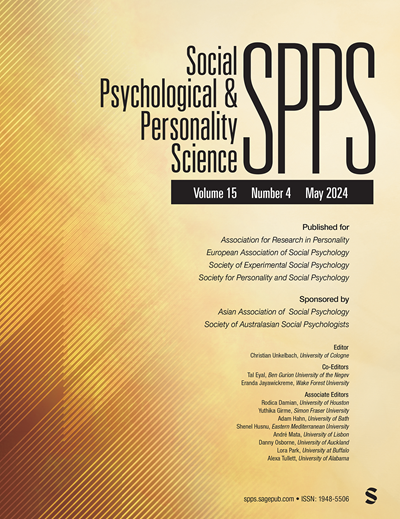提供和接受的社会支持与人际关系满意度和自尊心有何关系?竞合假设的综合测试
IF 3.3
2区 心理学
Q1 PSYCHOLOGY, SOCIAL
引用次数: 0
摘要
伴侣在恋爱关系中提供和获得的社会支持对心理健康非常重要。但究竟是在什么意义上呢?文献中存在着不同的、高度细微的假设。我们明确提出了这些假设,利用响应面分析法为每种假设指定了一个统计模型,并同时测试了哪种模型最有实证支持。我们分析了 16,000 多名参与者的数据,研究了社会支持的数量与关系满意度(参与者本人和伴侣)和自尊(参与者本人)之间的关系。就参与者本人的关系满意度而言,假设提供和接受的社会支持越多,满意度越高的模型得到了最多的经验支持。在伴侣关系满意度和参与者自尊方面,将伴侣在支持方面的(不)相似性也考虑在内的模型也得到了支持。总之,支持的绝对量似乎普遍重要,在某些情况下,伴侣的(不)相似性似乎也很重要。本文章由计算机程序翻译,如有差异,请以英文原文为准。
How Are Provided and Received Social Support Related to Relationship Satisfaction and Self-Esteem? A Comprehensive Test of Competing Hypotheses
The amount of social support partners provide and receive in romantic relationships is important for psychological well-being. But in what sense exactly? Divergent and highly nuanced hypotheses exist in the literature. We explicitly spelled out these hypotheses, specified a statistical model for each using response surface analyses, and simultaneously tested which model had the most empirical support. We analyzed data from more than 16,000 participants and investigated how the amount of social support relates to relationship satisfaction (of participants themselves and partners) and self-esteem (of participants themselves). For participants’ own relationship satisfaction, models postulating that more provided and received social support is linked to higher satisfaction had the most empirical support. For partners’ relationship satisfaction and participants’ self-esteem, models that also take partners’ (dis)-similarity in supportiveness into account received support. In total, the absolute amount of support seems to generally matter and, in some cases, partners’ (dis)-similarity seems relevant.
求助全文
通过发布文献求助,成功后即可免费获取论文全文。
去求助
来源期刊

Social Psychological and Personality Science
PSYCHOLOGY, SOCIAL-
CiteScore
12.50
自引率
1.80%
发文量
77
期刊介绍:
Social Psychological and Personality Science (SPPS) is a distinctive journal in the fields of social and personality psychology that focuses on publishing brief empirical study reports, typically limited to 5000 words. The journal's mission is to disseminate research that significantly contributes to the advancement of social psychological and personality science. It welcomes submissions that introduce new theories, present empirical data, propose innovative methods, or offer a combination of these elements. SPPS also places a high value on replication studies, giving them serious consideration regardless of whether they confirm or challenge the original findings, with a particular emphasis on replications of studies initially published in SPPS. The journal is committed to a rapid review and publication process, ensuring that research can swiftly enter the scientific discourse and become an integral part of ongoing academic conversations.
 求助内容:
求助内容: 应助结果提醒方式:
应助结果提醒方式:


